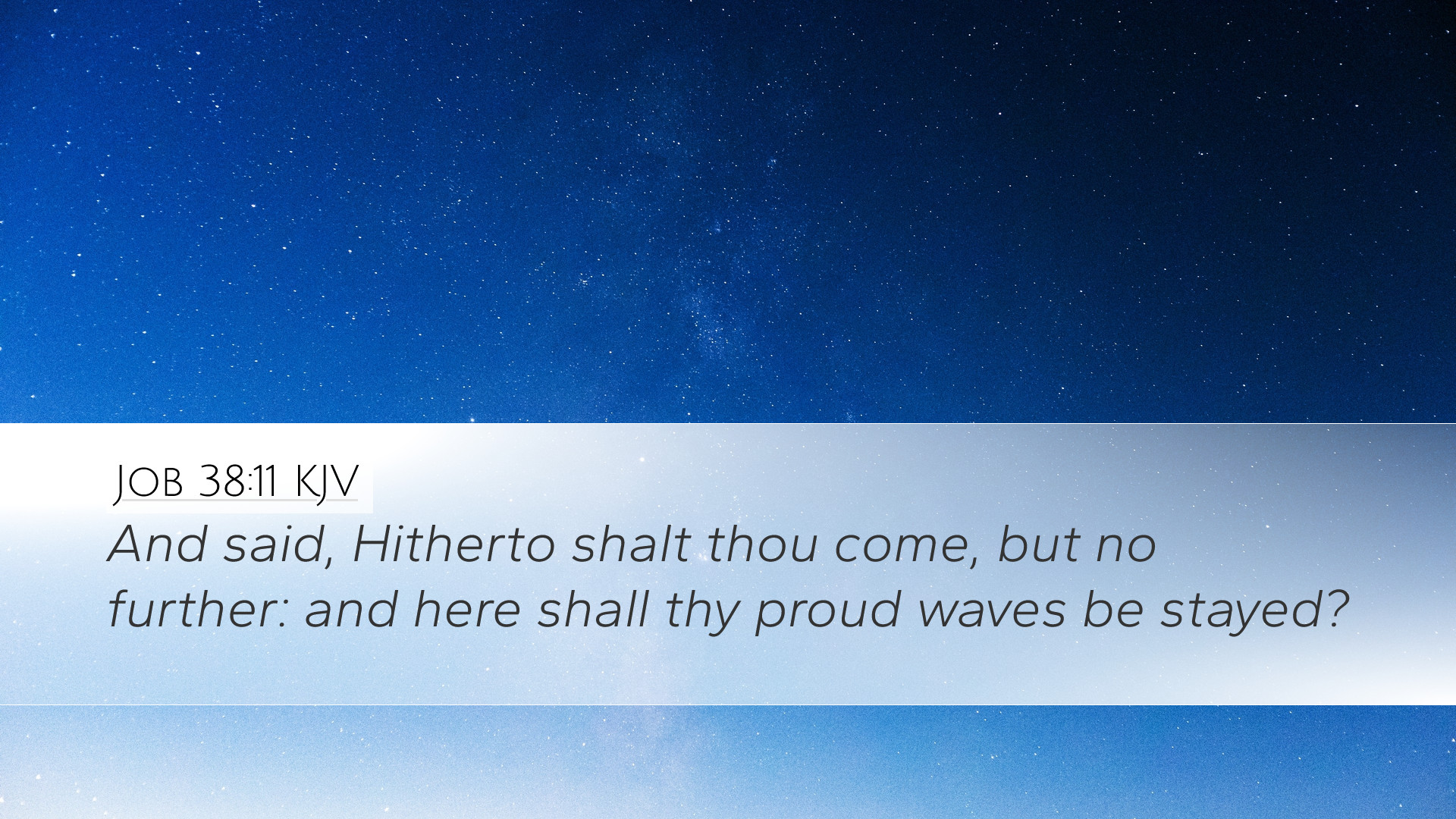Commentary on Job 38:11
Job 38:11 states, "And said, ‘Thus far shall you come, and no farther, and here shall your proud waves be stayed!’" This passage occurs in a remarkable section of Scripture where God directly confronts Job, leading him to understand the vastness of divine wisdom compared to human limitation. This commentary will explore the theological implications and exegetical insights surrounding this profound verse.
Contextual Background
The Book of Job addresses profound questions of suffering, justice, and divine sovereignty. Following the intense dialogues between Job and his friends, where the mystery of Job's suffering unfolds, God chooses to respond from a whirlwind, presenting a series of questions that highlight His omnipotence. Job 38 marks a pivotal point where God emphasizes His authority over creation.
The Nature of God's Sovereignty
Matthew Henry emphasizes that God's declaration in this verse serves as a reminder of His sovereignty over nature. The imagery of the sea and the waves represents chaos and the boundary set by God against chaos, symbolizing both physical limitations and spiritual boundaries. Henry notes that God is reminding Job that He is in control of the natural order, a cornerstone of His divine majesty.
- Divine Authority Over Creation: God explicitly limits the encroachment of the sea, which signifies His power to set boundaries in creation.
- Human Limitations: The imposition of limits serves to remind humanity of its place in relation to the Creator.
Insights from Albert Barnes
Albert Barnes elaborates on the passage, focusing on the metaphorical meanings of divine commands over nature. He conveys that God's command to the sea not to proceed further underscores the authority that God possesses over all elements. The waves are portrayed as proud, but are ultimately subdued by divine decree. Barnes makes a crucial connection with spiritual pride, asserting that just as the waves of the sea encounter their boundaries, so too does human pride meet its limits in the presence of God.
- Imagery of the Sea: Represents chaos and rebellion against divine order.
- Submission of Pride: Emphasizes that human pride cannot trespass beyond the limits established by God.
Reflections from Adam Clarke
Adam Clarke provides insight into the poetic nature of the language used in this verse. He notes the personification of the sea’s waves, portraying them as entities with pride. Clarke suggests that the phrase "Thus far shall you come, and no farther" signifies not only a physical barrier but also serves as a profound spiritual lesson. It illustrates that God sets limits on all aspects of life, including human endeavors and sufferings, and assures that divine justice is at work even amidst adversity.
- Personification: Clarke’s emphasis on the waves having pride illustrates the frailty and transient nature of human ambitions compared to divine authority.
- Spiritual Limits: God's command serves to instill hope that suffering has boundaries and that God oversees even the toughest trials in life.
Theological Applications
This verse calls believers to recognize the transcendent power of God. It serves as a vital reminder that God's purposes, justice, and authority govern all creation. The limitation of the sea demonstrates divine providence and restraint in the midst of chaos, thus providing assurance of God's actions in our lives. For pastors and theologians, this message encourages the understanding that while life often presents untamed waves of difficulty, God remains sovereign, defining the parameters within which they operate.
Lessons for Believers
From Job 38:11, several key lessons emerge that can be impactful for believers facing challenges.
- Trust in Divine Sovereignty: Amidst life's storms, trust that God has established boundaries for your trials.
- Approach with Humility: Recognize human limitations in understanding God's ways; the call is to submit to His divine plan.
- Find Hope in Boundaries: Just as the sea cannot overflow its banks, understand that suffering has limits; God's mercy prevails.
Conclusion
Job 38:11 encapsulates a profound truth about God's absolute authority over creation and the workings of the world. Through perspectives from influential theologians such as Matthew Henry, Albert Barnes, and Adam Clarke, we glean insights that empower believers to embrace their limitations while finding solace in the infinite wisdom of God. As pastors, theologians, and scholars reflect on this verse, may they communicate the assurance of God's sovereignty, reminding all that while we face the proud waves of life, God has decreed our boundaries.


